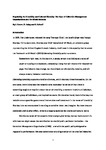Regulating for Creativity and Cultural Diversity: the Case of Collective Management Organisations and the Music Industry
| dc.contributor.author | Street, J | |
| dc.contributor.author | Laing, D | |
| dc.contributor.author | Schroff, Simone | |
| dc.date.accessioned | 2019-07-05T09:56:17Z | |
| dc.date.available | 2019-07-05T09:56:17Z | |
| dc.date.issued | 2018 | |
| dc.identifier.issn | 1477-2833 | |
| dc.identifier.issn | 1477-2833 | |
| dc.identifier.uri | http://hdl.handle.net/10026.1/14603 | |
| dc.description.abstract |
This paper explores the role of intermediary institutions in promoting creativity and cultural diversity in the music industry, and the impact of cultural policy on the performance of those intermediaries. It reviews some of the existing literature on the relationship between economic conditions and innovation in music, and argues that too little attention has been paid to intermediaries. Focusing on collective management organisations (CMOs) as one example of overlooked intermediaries, we illustrate, by way of comparison, the different priorities and incentives that drive CMO practice. These variations, we suggest, are important to appreciating how CMOs operate as intermediaries in different territories. We then turn our attention to recent attempts by the EU to reform CMO practice as part of its Digital Single Market project. The fact that the CMO has been an object of reform is indicative of its importance. However, there is more at stake here: the reforms themselves, in seeking to change the role and behaviour of CMOs will, we suggest, have profound consequences for the market in music in Europe, and for creativity and cultural diversity within that market. | |
| dc.format.extent | 368-386 | |
| dc.language | en | |
| dc.language.iso | en | |
| dc.publisher | Taylor & Francis (Routledge) | |
| dc.subject | collective management organisations | |
| dc.subject | creativity | |
| dc.subject | cultural diversity | |
| dc.subject | Digital Single Market | |
| dc.subject | EU | |
| dc.subject | music industry | |
| dc.title | Regulating for Creativity and Cultural Diversity: the Case of Collective Management Organisations and the Music Industry | |
| dc.type | journal-article | |
| dc.type | JOUR | |
| plymouth.issue | 3 | |
| plymouth.volume | 24 | |
| plymouth.publication-status | Published | |
| plymouth.journal | International Journal of Cultural Policy | |
| dc.identifier.doi | 10.1080/10286632.2016.1178733 | |
| plymouth.organisational-group | /Plymouth | |
| plymouth.organisational-group | /Plymouth/Faculty of Arts, Humanities and Business | |
| plymouth.organisational-group | /Plymouth/Faculty of Arts, Humanities and Business/School of Society and Culture | |
| plymouth.organisational-group | /Plymouth/REF 2021 Researchers by UoA | |
| plymouth.organisational-group | /Plymouth/REF 2021 Researchers by UoA/UoA18 Law | |
| plymouth.organisational-group | /Plymouth/Users by role | |
| plymouth.organisational-group | /Plymouth/Users by role/Academics | |
| dcterms.dateAccepted | 2016-04-12 | |
| dc.identifier.eissn | 1477-2833 | |
| dc.rights.embargoperiod | Not known | |
| rioxxterms.versionofrecord | 10.1080/10286632.2016.1178733 | |
| rioxxterms.licenseref.uri | http://www.rioxx.net/licenses/all-rights-reserved | |
| rioxxterms.licenseref.startdate | 2018 | |
| rioxxterms.type | Journal Article/Review |


